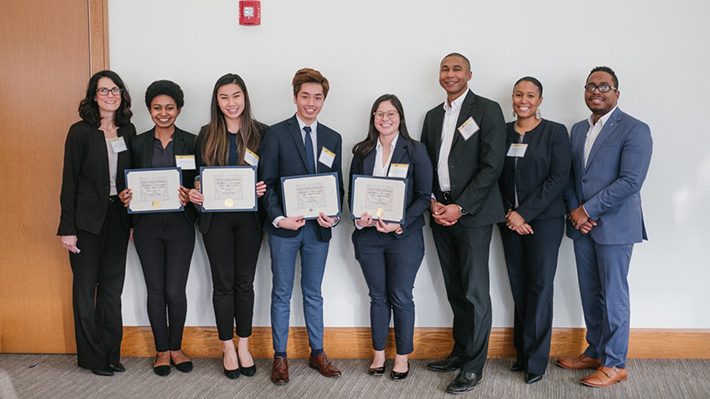The Muddled World of Leadership Cliches, and More – Philadelphia News

As November draws to a close, let’s take a look at some of the biggest business school stories coming out of Philadelphia business schools this week.
Three Big Leadership Clichés – and How to Rethink Them – LinkedIn
Geoffrey Garrett, Dean of The Wharton School and official LinkedIn “Influencer,” recently took to the social media site to talk about the gamut of leadership cliches that dominate the conversation around those roles.
In a conversation with a group of upper-level executives at the Wharton CEO Academy in New York, Garrett pivoted away from the following three cliches, turning them into something more modern, useful, and promising:
1.) Stick to your guns
2.) Question everything
3.) It’s a marathon, not a sprint
On sticking to one’s guns, Garrett emphasizes certain elements of 1980s corporate and political culture that found esteeming value when a leader does not waver on their principles. “Sticking to your guns is valued because it signals strength, courage and commitment under adversity, which is why we so often think about war heroes in this way,” he says.
He notes, however, that there is value in knowing when to “fold ’em” with a key Kenny Rogers reference in tow. “There is no simple score sheet to tell you when the positives from sticking to your guns become outweighed by the negatives. But the world is littered with examples where leaders wait too long to make the switch. Think General Lee’s historic defeat at Gettysburg in the American Civil War, Jeff Immelt at GE or John Chambers at Cisco,” Garrett continues.
“Most leaders will change course eventually because there is not much valor in heroic defeats. But the best leaders will change course long before the writing is on the wall. Compare the demise of Kodak with the transformation of IBM. But how do you know when the writing is on the wall? The answer is judgment, arguably the most valuable trait in a leader. It’s easy to recognize in hindsight, because good leaders make good decisions—the definition of good judgment.”
To see the rest of Garrett’s advice on leadership cliches, head over to LinkedIn.
Drexel Students Win Second Annual Diversity Case Competition – Drexel LeBow News
Students from the Drexel University LeBow College of Business brought home a brand new title as winners of the second annual Diversity and Inclusion Business Case Competition.
Drexel LeBow defeated 11 other local challenging universities in a competition with a goal to “help create a diversity training protocol for Home Away From Home, a global hotel chain,” according to the business school.

Winners from the LeBow College of Business at the second annual Diversity and Inclusion Business Case Competition / Photo via lebow.drexel.edu
The LeBow team of “Johnny Zhu, Kimberly Gain, Stephanie Arredondo, and Rachael Wright” nabbed first place with their curiously-titled “Raising Our One Family (ROOF)” strategy. Zhu explains, “ROOF stands for the overall company-wide training, which is rolled out in the form of top-down management and tailored to individual locations, corporate level, and field level. This proposal is not a mold, but a 360-integrated training approach where as a family, employees are living out the mindset of diversity and inclusion, not only to guests but to each other as well.”
To learn more about the Drexel LeBow team and the case competition, click here.
The Bizarre Bias That Affects How You Shop – BBC
The work of Beth Vallen, a researcher at the Villanova School of Business, was recently highlighted by author Martha Henriques in the BBC regarding just how pervasive “anti-fat” bias can be.
Henriques notes that overweight people tend to statistically suffer when it comes to things like job offerings, and even get less eye-contact than people of average weight and size. It is perhaps not so surprising to find that business models are often altered for overweight people.
In “Shape and Trait‐Congruency: Using Appearance‐based Cues as a Basis for Product Recommendations,” a new study authored by Vallen and colleagues Karthik Sridhar, Dan Rubin, Veronika Ilyuk, Lauren G. Block, and Jennifer J. Argo—published in the Journal of Consumer Psychology—found that overweight customers were offered more products that resembled their body types, even if the products, such as bottles of perfume, were not wearable.
Speaking with Henriques, Vallen says, “Our thinking was these subtle prejudices that lead to these effects are based on something more than superficial shape-matching.”
“We wanted to show that this was a bias that reflects the thoughts and decisions processes of all people, not just sales people.”
To read more about the study, head over to the BBC website and the Journal of Consumer Psychology.
Berkeley Haas Fellow Talks Myopia in the Face of Information Overload

In an era of information overload, habits can turn primal, according to Berkeley Haas School of Business teaching fellow Maura O’Neill.
O’Neill, who is also the Faculty Director of UC Berkeley’s Executive Leadership Program, and the former Chief Innovation Officer of the U.S. Agency for International Development under President Obama, says that the “cognitive myopia” or narrow-mindedness that results from the sheer bombardment of sensory data flying at us every moment forces us to “rely heavily on our long-term memory to make decisions.”
O’Neill believes that these types of shortcuts—natural responses to over-stimulation—are where errors in judgment begin and “[sometimes] these decision-making errors can lead to catastrophic results,” she writes.
According to the article, “By blocking information that doesn’t fit with what we already know, or think we want to know, our brains enable us to make decisions quickly and efficiently. But often, we overlook key data deliberately or unconsciously.”
O’Neill cites governmental failures like pre-9/11 terrorist warnings the 2008 financial crisis, as well as industrial failures like the “taxi industry’s failure to recognize how smartphones could revolutionize ride-hailing services,” as well as “Uber’s belief that its treatment of workers and regulators would not impact its business reputation and growth.”
Many researchers and pundits are quick to point to big data to save the day but analytics have the potential to exacerbate narrow-mindedness if “statistics used to predict future events are based on past patterns.”
She points to an example where the state of Michigan discovered fraudulent claims for state unemployment insurance from a faulty big data algorithm and wrongfully terminated 20,000 human claims reps.
O’Neill writes, “If we don’t get the algorithms right, we’re setting ourselves up for failure.” Data notwithstanding, O’Neill says we need to take collective steps to reflect on our own unconscious biases.
O’Neill concludes, “Until everyone recognizes that we are all narrow-minded, we are not going to overcome it. And the remedies to the most pressing business problems or in government or in our own personal lives are going to require new innovative solutions.”
